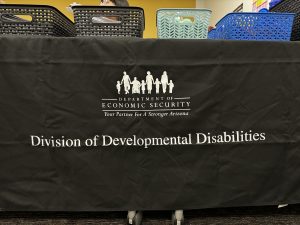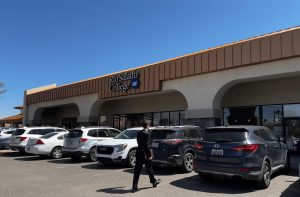- Slug: BC-CNS-Sensory Job Fair. 780 words.
- 2 photos available (thumbnails, captions below).
By Annika Tourlas
Cronkite News
TEMPE – A Sensory Friendly Job Fair gave individuals with autism and autism spectrum disorder an opportunity to meet and be interviewed by more than a dozen potential employers on April 9 in Tempe.
The job fair was organized by the Arizona Department of Economic Security, the Autism Society of Greater Phoenix and Rio Salado College. Timothy Stump, vocational rehabilitation employer liaison at the Arizona Department of Economic Security, organized the fair.
“Our mission is to put people back to work who have disabilities,” Stump said. “I’ve been working doing this kind of work for two decades.”
Event staff made the environment sensory-friendly by adjusting lighting and staggering arrival times to reduce hallway traffic. All meetings with employers were held in carpeted private rooms to create a calmer and less-stimulating atmosphere.
The Bureau of Labor Statistics found that 22.5% of people with disabilities were employed in 2023, the highest ratio since data collection began in 2008. Despite steady gains over that period, the unemployment rate for people with disabilities, at 7.2%, was nearly twice as high as for people without disabilities.
Specifically, adults with autism are unemployed and underemployed compared to adults with other disabilities, according to the Interagency Autism Coordinating Committee. State agencies and advocacy organizations are working to increase opportunities to help raise employment for those people.
When they first arrived at the job fair, employers and job seekers attended a workshop led by Arizona State University Professor James B. Adams. The informational workshop taught best hiring practices to employers, including how to make accommodations for adults with autism. Meanwhile, job seekers gained guidance on how to find fair and secure employment.
More than a dozen employers attended the job fair, including the CIA, Marriott, Western Alliance Bank, Medtronic, Walgreens and MOD Pizza. Stump noted that several employers, like MOD Pizza and the CIA, were first-time attendees. The variety of employers at the event attracted adults with a wide array of interests and goals.
Kathryn Gregory graduated from Arizona State University with a bachelor’s degree in chemical engineering in May 2021. Two years later, Gregory was diagnosed with autism spectrum disorder, which helped her understand why she found navigating social situations difficult.
After the pandemic paused her job search, Gregory set her sights on employers where she could use her chemical engineering degree and skills. As this was her first job fair, Gregory expected to walk into a loud, overwhelming environment, but she was happily surprised.
“Having people who know what to expect is really nice in an unexpected way,” Gregory said. “I grew up just always vaguely knowing that I was not the greatest at this kind of experience. So knowing that there’s people here who expect my difficulties and are willing to work with me through those is nice.”
Stump noted that many job seekers participating in the DES Vocational Rehabilitation Program have trouble finding employment because the interview process can be over-stimulating, and their work history can be minimal due to their disability. Therefore, understanding an adult’s disability and accommodations, as was done at the fair, can ease the process and help them find ideal positions.
Employers and those at the vocational rehabilitation program often hear success stories from those who got employment with their services and guidance. Stump, the father of an adult with a disability, recalled watching his son come into his own after finding employment.
“The employers are thrilled, and the job seekers are thrilled. And the moms and the dads are thrilled,” Stump said. “As a father of somebody with a disability, I know how much it changes them and how much confidence that they’re going to suddenly get when they start working.”
Employers also expressed how they benefit by hiring adults with autism and other disabilities. Employers like MOD Pizza offered accommodations for the interview process and expressed their willingness to implement further accommodations in the workplace.
Cay Hazel, the general manager at MOD Pizza Tempe Marketplace, has an employee who came from the company’s partnership with Best Buddies International. Hazel realized that working at MOD Pizza drew the man out of his shell, so much so that he now sings aloud for customers as he works. He benefits from being gainfully employed, and Hazel benefits from her working relationship with him.
“I personally have never worked with anybody who had an IDD (intellectual or developmental disability) before I started with this company, and it really changed me wholeheartedly,” Hazel said. “It changed my life. It really did. And I feel like a better person because of it. I love it.”

